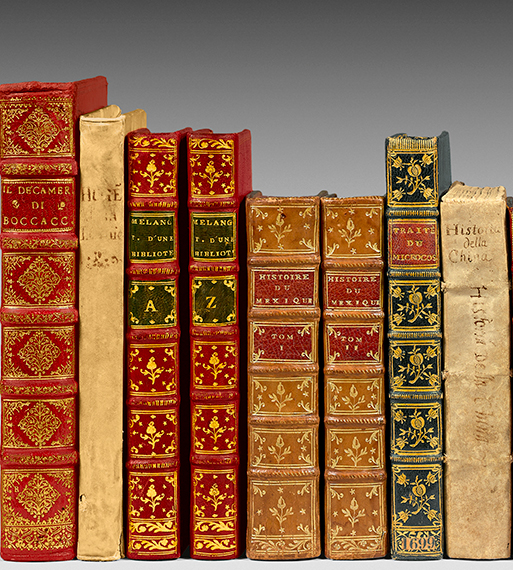Magnificent copy bringing together two major original editions of Bossuet
bound in contemporary red morocco.
Paris, 1731.
Bossuet. Traitez du libre-arbitre, and de la concupiscence. Posthumous works (given by Jacques-Bénigne, nephew).
Paris, Barthélemy Alix, 1731.
2 parts in 1 volume in-12 of 26 pp., (3) ff. of table, 155 pp., (1) f. blank, (1) title page, 218 pp., (6) ff. Bound in full contemporary red morocco, blind tooled fillet framing the boards, richly adorned ribbed spine with fleurdelys scroll rolls, gilt fillet on cuts, interior gilt roll, gilt edges on marbling. Contemporary binding.
168 x 94 mm.
Original edition of two major treatises by Bossuet.
Bibliothèque de Backer, no. 998; Bulletin Morgand and Fatout, no. 129; Rahir, The Bibliophile’s Library, 336; Tchemerzine, I, 905; Brunet, I, 1139.
Bossuet was appointed tutor to the Dauphin in 1670 and the Traité du libre-arbitre is one of the works composed for the education of the future sovereign.
The subject matter deals with the ‘means of reconciling our Freedom with the certainty of God’s decrees’. The issue of whether there are human choices independently of the sovereign grace of God had just divided the Catholics of France into two camps: the Jesuits, supported by the high clergy as well as by the King, and the Jansenists of Port-Royal, a minority but united around brilliant theological and intellectual authorities such as Arnault and Pascal. However, the years that saw Bossuet tutor the Dauphin almost perfectly coincide with the Peace of the French Church (1668-1678). Moreover, the Jansenists were among the few people not to come into conflict with Bossuet, even if his position at Court did not allow him to openly express too much interest in the theology of Port-Royal.
Thus the richness of the Traité du libre-arbitre mainly lies in the fragile but courageous synthesis (it is still to the future King of France that Bossuet addresses himself), of two doctrines nonetheless fiercely opposed. This little-known text provides a very accurate measure of a period of official tolerance soon defeated by the tightening of liberties in matters of religion.
The Traité de la concupiscence, composed around 1693, reflects the subsequent era, a troubled period where doctrinal positions are much more rigid and morals much more lax. Bishop of Meaux since 1681, listened to by the court who moved from Paris and Versailles to hear his sermons, undisputed doctor of the Church of France, Bossuet here attacks libertines, worldlings, inveighing against the falsehood of their spirit and the vanity of their life. This text was to be entitled Considerations on the words of Saint John: ‘Do not love the world’ but Bossuet’s nephew, bishop of Troyes and preface writer of this edition, preferred the other, more severe title.
The connection with Versailles was maintained until the end of Bossuet’s life. He occupied an essential place within the court of France, serving as an advisor to the King in his councils and an ordinary advisor in his State councils.
Magnificent copy, particularly fresh and large-margined (height: 168 mm), preserved in its rare quality contemporary red morocco binding.
The original editions of Bossuet preserved in contemporary morocco have always been sought after by bibliophiles.

